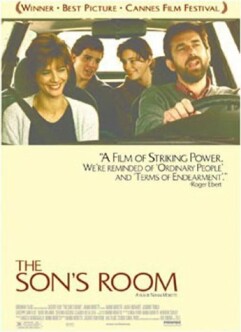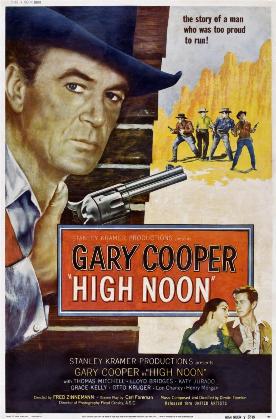Son’s Room, The (La Stanza del Figlio)
Phew! The Son’s Room (La Stanza del Figlio) by Nanni Moretti
(co- written with Linda Ferri and Heidrun Schleef) is an almost unbearable
portrait of a family’s grief over the death of a son. The film’s
unblinking eye does not let us turn away for a moment from the horror of such a
loss (in a scuba-diving accident) or the unavailing attempts of each member of
the family, different as they are, to come to terms with it. And the horror is
not lessened but made worse by the humor — for which Mr. Moretti is best
known in Italy — with which the story is told. I admired In the
Bedroom, but its portrayal of a pair of grieving parents is crude and
obvious by comparison.
Moretti himself plays the father, Giovanni, who is a psychiatrist, and it is
a brilliant device for him to devote substantial portions (though never too
much) of the picture to his sessions with his patients. In fact, he blames
himself for his son’s death because he had only gone diving on that Sunday
morning because their original plan to go running together had had to be
postponed by his own sense of duty to a patient called Oscar (Silvio Orlando,
who starred in one of my favorite movies of the last decade, Not of this
World), a bore and apparent hysteric with suicidal tendencies who was having
what he fancied was a nervous emergency and had asked to see him immediately. As
it happened, he had been diagnosed with cancer and, suddenly forgetting any
thoughts of suicide he may have had, was terrified. It proves to be a lesson in
perspective and proportion that the doctor will soon be in need of himself.
Instead, on learning the news, Giovanni keeps re-running the tape of that
morning in his head, imagining himself saying no to Oscar and running as planned
with his son, Andrea (Giuseppe Sanfelice). While he, the psychiatrist, is
obsessing, continually trying to imagine alternative cases, to find out what
went wrong, and asking how it could be possible that no one was to blame, his
wife Paola (Laura Morante), the boy’s mother, feels the blow more keenly
but is also more accepting of her fate. We get the sense that she simply has a
greater capacity for suffering, a lesser for denial. And their daughter, Irene
(Jasmine Trinca) who was close in age and in feeling to her brother, seems to
look to her parents to tutor her in grief. The scene in which the father arrives
at his daughter’s basketball game to give her the news of her
brother’s death is quite devastating. She smiles to see him at the
sideline while she is taking the ball down the court and then, seeing the look
on his face, suddenly freezes, losing the ball. She stands motionless as the
tide of play reverses back the way she has come.
Obviously there is much to be done with the built-in ironies awakened by the
patients’ petty problems, most of them the result of their own boredom and
self-absorption, in juxtaposition with their doctor’s terrible loss. There
is only one point, when a middle-aged woman patient is describing how she and
her husband would have liked to have had children but were never able to, that
the doctor breaks down in his consulting room. But every one of the patients
seems to have something to say that re-opens his wound. Some of them catch
themselves and apologize immediately, while others charge ahead with their own
stories in blithe unconsciousness of the effect they are having. More and more
he is unable to attend to their ramblings and, after a few weeks of trying to
cope, he decides that he must give up his practice.
It is a decision which has different and unexpected effects on each of the
patients — Oscar proves unexpectedly sweet and thanks the doctor for the
help he has given him — and in their reactions we begin to see, as perhaps
the doctor does, glimpses of life going on. So does the whole family when a
letter arrives for Andrea from a girlfriend no one knew he had. He had known the
girl, Arianna (Sofia Vigliar), only for a day at a camp he had attended during
the summer, and the brevity of their encounter and the feeling it engendered
comes to stand for something essential about Andrea’s too-brief life. The
letter is full of adolescent but no less touching talk of love, rendered
miserably poignant by the fact that it was written in ignorance of its
recipient’s fate.
Giovanni says he will write to the girl, but finds himself unable to do so.
Paola impatiently takes matters into her own hands and telephones, saying she
wants to meet her. But Arianna — we gather from Paola’ side of the
conversation — would rather not. A consolation is lost. Some time later,
however, and quite unexpectedly, Arianna turns up on the family’s
doorstep. When she does so only Giovanni is at home. He had been far less eager
to see or know the girl, but he takes to her immediately, and shows her
Andrea’s now vacant room. Arianna tells him that she had had an idea of
what it looked like because Andrea had sent her some photographs of himself,
taken with a timer, in his room. As Giovanni looks at the photos he is again
overcome with emotion.
When Paola comes home she is at first surprisingly reluctant to see the girl
she had so eagerly wished to see earlier, but soon she too is taken with her.
Both parents offer her the chance to stay and suggest they go out for a meal,
but Arianna has another surprise for them. She has arrived with a friend,
Stefano (Alessandro Ascoli), with whom she is hitchhiking to France.
They’ll be off tonight, if it’s OK with them. The family is taken
aback, but in the end decide to give the young couple a lift, at first to the
expressway, then to the next rest stop, where there will be more potential
rides, then to Genoa and finally all the way to the French border, where they
arrive as dawn is breaking. Irene wakes up, as the young couple do, and is full
of indignation at her parents. “Where the f*** are we?” she
reproaches them. “I have training today. . .a game on Sunday.” But
as she speaks she sees her parents smile at her, then begin laughing.
It is the first moment since her brother’s death that they have been
able to laugh, and, while asking them “What is it?” Irene can hardly
stop herself from laughing with them, unsure why. The suggestion, I think, is
that it has taken the example of Arianna to put their grief into perspective
— just as the parade of psychiatric patients and their little problems
has, unbeknownst to them, been put into perspective by the doctor’s grief.
Arianna, whom they love because she loved Andrea, has loved with the intensity
of youth, but has also recovered from her love with youth’s resiliency.
Already she has attached herself to Stefano, which could disgust them but
somehow does not. On the contrary, they rather like Stefano, and all wave
cheerily to the young couple as they get on a bus for their further adventures
in France. It’s not that their grief has been taken away but rather that
they have finally, almost without realizing it, been enabled to live with it
without breaking down under the burden.
Discover more from James Bowman
Subscribe to get the latest posts to your email.








